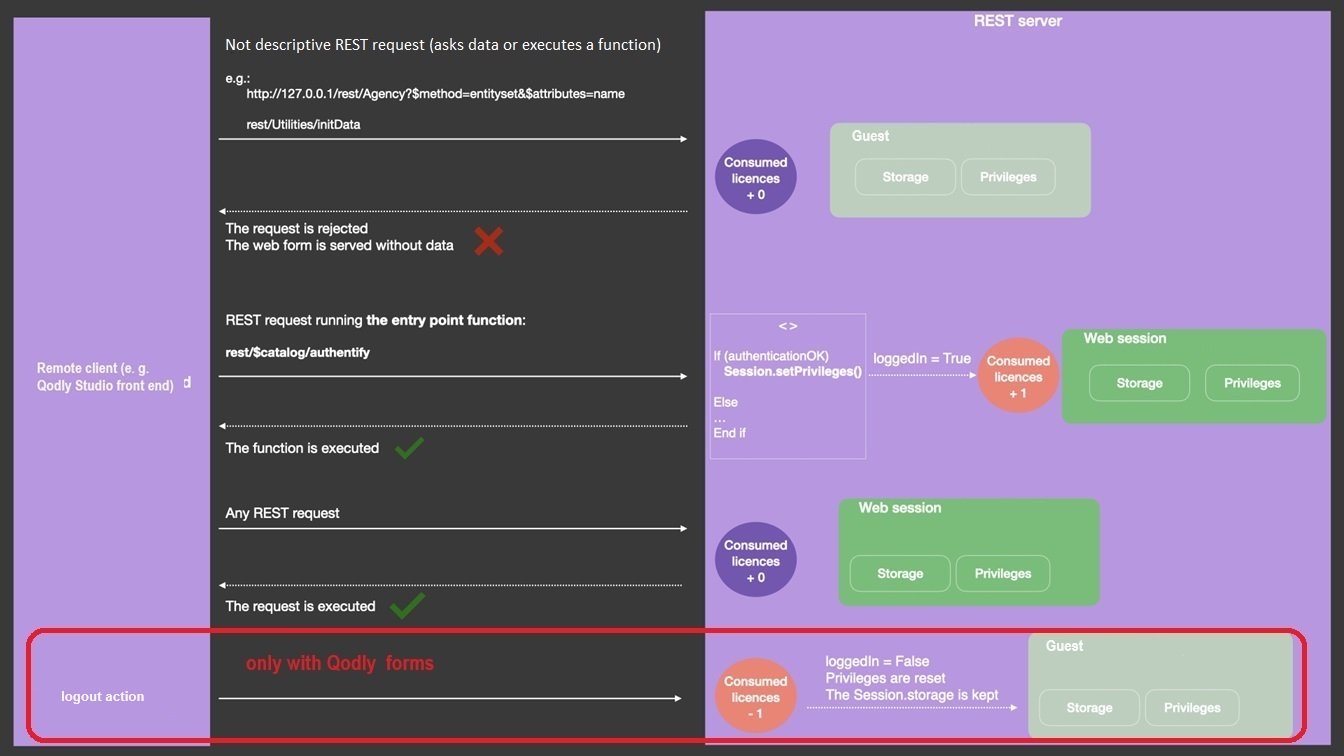Usuários e sessões
Sessões
Quando sessões escalonáveis estão ativadas (recomendado), as solicitações REST podem criar e usar sessões de usuário Web, fornecendo recursos adicionais, como manipulação de várias solicitações, compartilhamento de dados entre processos de clientes da Web e controle de privilégios de usuário.
Cuando se abre una sesión de usuario web, puede manejarla a través del objeto Session y la Session API. Subsequent REST requests reuse the same session cookie.
Uma sessão é aberta depois que o usuário é autenticado com sucesso (veja abaixo).
- On 4D Server, opening a REST session requires that a free 4D client license is available.
- Em 4D single-user, pode abrir até três sessões REST para fins de teste.
Force login mode
O modo de login legado baseado no método de banco de dados On REST Authentication é obsoleto a partir de 4D 20 R6. Agora é recomendado usar o modo de login forçado (automaticamente habilitado em novos projetos) e implementar a função ds.authentify(). Em projetos convertidos, um botão na caixa de diálogo Configurações o ajudará a atualizar sua configuração. No Qodly Studio para 4D, o modo pode ser definido usando a opção Forçar login no painel de Privilégios.
A sequência de login do usuário é a seguinte:
-
At the first REST call (for a Qodly page call for example), a "guest" web user session is created. Não tem privilégios, nenhum direito de executar solicitações diferentes da solicitações REST descritivas, sem consumo de licença.
Descriptive REST requests are always processed by the server, even if no web user session using a license is opened. In this case, they are processed through "guest" sessions. -
Você chama sua
authentify()(criado previamente), na qual você verifica as credenciais do usuário e chamaSession.setPrivileges()com privilégios apropriados.authentify()deve ser uma função de datastore class exposta. -
La petición
/rest/$catalog/authentifyse envía al servidor junto con las credenciales del usuario. This step only requires a basic login form that do not access data; it can be a Qodly page (called via the/rest/$getWebFormrequest). -
If the user is successfully authentified, a 4D license is consumed on the server and all REST requests are accepted.

In the user login phase, license usage is disconnected from web user sessions. Uma licença só é necessária quando a Session.setPrivileges() é executada, permitindo que você controle o número de licenças usadas.
All other REST requests (handling data or executing a function) will only be processed if they are executed within a web session with appropriate privileges, otherwise they return an error. Para atribuir privilégios a uma sessão web, você precisa executar a função Session.setPrivileges() para a sessão. A execução dessa função aciona o consumo da licença 4D.
Solicitações REST descritivas
As solicitações REST descritivas podem ser processadas em sessões de usuário Web que não exigem licenças (sessões "guest"). Essas solicitações são:
- Solicitações
/rest/$catalog(por exemplo,/rest/$catalog/$all) - acesso às dataclasses disponíveis /rest/$catalog/authentify- la función del almacén de datos utilizada para iniciar sesión del usuario/rest/$getWebForm- Renderização de uma página Qodly

Function authentify
Sintaxe
exposed Function authentify({params : type}) {-> result : type}
// code
A função authentify() precisa ser implementada na classe DataStore do projeto e precisa ser chamada através de uma solicitação REST.
This function is the only available entry point from REST guest sessions when the "force login" mode is enabled: any other function call or data access is rejected until the .setPrivileges() function is called and the session acquires appropriate privileges.
The authentify() function can always be executed by a REST guest session, whatever the roles.json file configuration.
A função pode receber qualquer autenticação ou informação contextual como parâmetro(s) e pode retornar qualquer valor. Since this function can only be called from a REST request, parameters must be passed through the body of the POST request.
Esta função deve conter duas partes:
- some code to identify and authenticate the REST request sender,
- se a autenticação for bem-sucedida, uma chamada para
Session.setPrivileges()que atribui os privilégios apropriados à sessão.
Se a função não chamar Session.setPrivileges(), nenhum privilégio será atribuído, nenhuma licença será consumida e solicitações REST subsequentes não descritivas serão rejeitadas.
Exemplo
You only want to know users to open a web session on the server. Ha creado la siguiente función authentify() en la clase datastore:
exposed Function authentify($credentials : Object) : Text
var $users : cs.UsersSelection
var $user : cs.UsersEntity
$users:=ds.Users.query("name = :1"; $credentials.name)
$user:=$users.first()
If ($user#Null) //the user is known
If (Verify password hash($credentials.password; $user.password))
Session.setPrivileges("vip")
Else
return "Wrong password"
End if
Else
return "Wrong user"
End if
Para llamar a la función authentify():
POST 127.0.0.1:8111/rest/$catalog/authentify
Corpo do pedido:
[{"name":"Henry",
"password":"123"}]